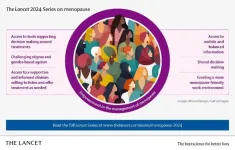(Press-News.org) The Lancet: Experts warn about the overmedicalisation of menopause and call for a new approach to how society views menopause and supports women as they age
Menopause is a life stage for half the world’s population and is generally depicted in a negative way. However, women’s experiences of menopause are unique and vary hugely.
The Lancet 2024 Series on menopause argues that an over-simplified narrative of menopause as a health problem to be solved by replacing hormones is not based on evidence and deflects attention from the need for substantial societal shifts in how menopause, and midlife/older women in general, are viewed and treated around the world.
The Series highlights how some groups, such as those who experience early menopause or cancer treatment-induced menopause often do not receive optimal care.
The Series questions the assumption that menopause often causes mental health problems and identifies specific at-risk groups who may need additional support.
The authors argue that a change in the narrative to view menopause as part of healthy ageing would reduce stigma and overmedicalisation, empowering women to navigate this life stage, acknowledged and supported by clinicians, researchers, workplaces, and wider society.
A new approach to menopause that better prepares and supports women during midlife is needed – going beyond medical treatments, to empower women using high-quality information on symptoms and treatments, empathic clinical care and workplace adjustments as required, says a new four paper Series published in The Lancet.
Series co-author, Professor Martha Hickey, University of Melbourne and Royal Women’s Hospital (Melbourne), says “The misconception of menopause as always being a medical issue which consistently heralds a decline in physical and mental health should be challenged across the whole of society. Many women live rewarding lives during and after menopause, contributing to work, family life and the wider society. Changing the narrative to view menopause as part of healthy ageing may better empower women to navigate this life stage and reduce fear and trepidation amongst those who have yet to experience it.”
She continues, “The experience of menopause differs for every person. Our Series calls for an individualised approach where women are empowered with accurate, consistent and impartial information to make informed decisions which are right for them over the menopause transition. This may include taking menopause hormone therapy (aka HRT) for symptoms such as hot flushes and night sweats, which can range from mild to extremely debilitating, after a discussion with their doctor about the risks and benefits. Whilst some women may also choose psychological therapies such as cognitive behavioural therapy to reduce the psychological impact of hot flushes and night sweats and improve sleep.”
Menopause as a part of healthy ageing
In many societies the topic of menopause has long been a taboo subject. Now, countries such as the UK, the USA and Australia are experiencing a ‘menopause moment’, with more open discussion across politics, workplaces and the media.
Whilst welcoming the increase in awareness of menopause, the Series’ authors raise concern about the media’s tendency to focus on extreme negative experiences of menopause, depicting it as an unfortunate and distressing experience heralding a critical downturn in women’s health which can only be solved by hormone replacement.
“Whilst it’s certainly the case that some women have extremely negative experiences of menopause and benefit from hormone therapies, that isn’t the whole picture. The reality is much more complex and varied, with some women reporting neutral experiences and others highlighting good aspects, such as freedom from menstruation and menstrual pain. Menopause is having a cultural moment, and this is an opportunity for it to be recognised as a natural part of healthy ageing for women which, with the right preparation and support, is not something to fear,” says Dr Lydia Brown, University of Melbourne.
There is a widely held belief that menopause is associated with poor mental health, however a review of 12 studies, published as part of the Series, which investigates the association between the menopause transition and depression does not confirm this. Two of the 12 studies report increased depressive symptoms over menopause, but three found no such increase and the remaining seven studies report mixed results. After reviewing these studies and others, the Series’ experts conclude there is no robust evidence that risk of anxiety, bipolar disorder, psychosis or suicide increases for all women over the menopause transition.
Empowered women with support across society
The Series calls for healthcare professionals, researchers, workplaces, and wider society to support the empowerment of women during menopause, ensuring they have the knowledge and self determination to make informed decisions and can seek effective help if needed.
Healthcare workers can support their patients by validating their experiences and providing balanced and consistent information about symptoms and treatment options if required, encouraging women to discuss their individual preferences to reach shared decisions.
A review of evidence on menopause symptoms highlights that hot flushes and/or night sweats affect up to 80% of women, with over a third (38%) describing these symptoms as moderate to severe at age 50 years. [1]
The most effective treatment for hot flushes and night sweats is hormone therapy - often referred to as Menopausal Hormone Therapy (MHT) or Hormone Replacement Therapy (HRT). Treating hot flushes may also improve sleep and mood and MHT prevents fractures in weak bones. However, evidence on the benefit of menopause hormone therapy on other symptoms associated with menopause and ageing in women is lacking. [2]
“There are several medications for menopause symptoms available as prescriptions that can be crucial tools in helping some women manage hot flushes and night sweats, possibly also leading to improved sleep and quality of life. These include menopause hormone therapy and non-hormonal alternatives, including newer agents targeting the neurokinin receptor such as fezolinetant. Information about these treatments, their benefits, risks, and comparative effectiveness should be made readily available to women seeking medication with the support of healthcare professionals. MHT is the best-known medication and data suggests it’s slightly more effective than alternative medications for treating hot flushes and night sweats. However, no medication can reliably resolve all negative experiences during menopause and commercial interests have influenced how MHT is presented - overshadowing evidence-based alternative options,” says Dr Andrea La Croix, University of California San Diego Herbert Wertheim School of Public Health and Human Longevity Science.
“As well as menopausal hormone therapy, clinicians should discuss additional ways to manage some menopausal symptoms, such as cognitive behaviour therapy for hot flushes and night sweats. CBT may also reduce stress and improve sleep and mood. Lifestyle changes addressing diet, smoking and exercise may additionally benefit sleep and mood and improve long-term health. Some don’t wish to take menopause hormone treatment unless their symptoms are severe and prefer to use other approaches. Our Series is all about increasing awareness of evidence-based options for women, so they can choose how they wish to navigate menopause, free from judgement and stigma,” adds Professor Myra Hunter, King's College London.
Unfortunately, commercial interests, such as organisations who are marketing menopause products to consumers including pharmaceutical companies and private providers, have strongly influenced media messaging about menopause and MHT. In this messaging, across both news media and social media, the small but serious risks of MHT are often downplayed or ignored. This Series argues that women should have access to accurate and evidence-based information about menopause in a form they can understand, created without undue commercial influence, such as the NIH funded My Meno Plan website in the USA. [3]
The authors also call for more research into aspects of menopause that are a priority for women. For example, a global Menopause Priority Setting Partnership is underway across more than 40 countries to develop a new, patient-focused research agenda. [4]
Workplaces, by the creation of open, inclusive and supportive cultures, have a role to play in supporting women during menopause. According to the UK Health and Safety Executive, women aged 45-54 report more work-related stress than men or women of any other age group, associated with high job demands, lack of control and lack of support. [5] A qualitative study of 137 women reported that women want their managers to be informed and empathetic about menopause and understand how the work environment might exacerbate their symptoms. [6]
The authors highlight how, through resources such Menopause at Work, employers can implement evidence-based and practical policies to support their employees including via education, conversations and flexible working hours. [7]
In addition to clinicians, researchers and workplaces, the authors highlight the need for a substantial societal shift in the views of midlife and older women, with a greater appreciation of their considerable contribution to society, their skills in the paid and unpaid workforce and how they often care for families across generations,
"There is a lot we can learn about attitudes to menopause and growing older in general from communities, such as many Asian cultures, where ageing in women confers respect and status, rather than stigma. Everyone can play a part in shifting society’s view of older women by engaging in conversation - such as those organised by the Menopause Cafe where people of all genders and ages gather to discuss menopause and share tips, questions and experiences,” says Rachel Weiss (not an author), founder of Menopause Cafe charity. [8]
She continues, “The pendulum has swung from 'put up and shut up' about menopause to sensationalising it. It's good that we are talking more about menopause, now we need to swing the pendulum to the middle and normalise menopause, so that anyone who wants to talk about it can, so that people are not scared of it and so that a diverse experience of menopause is depicted in the media, not just celebrity horror stories.”
Some women need specific care
Globally, around 10% of women experience menopause prematurely (under age 40) or early (between the ages of 40 and 44). There are often delays in diagnosis and some women experience feelings of distress and isolation. There is also evidence to suggest women who enter premature or early menopause may have an increased risk of conditions such as cardiovascular disease, and osteoporosis (fragile bones). Use of MHT may reduce these risks.
People with cancer are more likely to experience early menopause or menopause symptoms due to treatment. For example, endocrine therapy for breast cancer can cause hot flushes and/or night sweats that may be more severe and prolonged than natural menopause. Women with cancer often report a lack of centralised care and access to safe and effective treatments for their menopause symptoms.
Menopause does not usually cause mental health problems, but those with severe hot flushes/night sweats, previous clinical depression or recent stressful life events are at an increased risk of depression. There should be greater awareness and support for this group. Whilst MHT helps with hot flushes and night sweats, it is not a treatment for depression and clinicians should offer evidence-based treatments depending on severity and patient preference. [9]
Greater awareness, better understanding of mechanisms, new treatments and additional support for people who experience early menopause, menopause after cancer treatment and/or who are at a higher risk of depression over the menopause transition, is urgently needed.
The Series concludes all women should have access to realistic and balanced information about menopause and possible experiences, effective treatment as needed and shared decision-making to better equip them to navigate this life stage.
NOTES TO EDITORS
This Series lead author, Martha Hickey, is funded by an NHMRC Investigator Grant. For a full list of researchers see the four papers.
Quotes from Authors cannot be found in the text of the Article but have been supplied for the press release.
There will be an embargoed press briefing at the Australian Science Media Centre at 10am AEDT on Tuesday 5th March. If you are interested in attending or receiving the recording, please contact h.taylorlewis@lancet.com and Info@smc.org.au.
References:
[1] Anderson DJ, Chung HF, Seib CA, et al. Obesity, smoking, and risk of vasomotor menopausal symptoms: a pooled analysis of eight cohort studies. Am J Obstet Gynecol 2020; 222: 478.e1–17.
[2] Studies find that Menopausal Hormone Therapy (MHT) is the most effective treatment for hot flushes and night sweats and may also improve sleep and prevent bone loss. However, MHT has not been shown to help symptoms such as low energy, brain fog, reduced confidence, bloating, headaches, and mood swings. Research also finds MHT carries small but important risks of breast cancer, stroke, urinary incontinence, blood clots and potentially dementia. Guidelines are clear that MHT is not recommended for the prevention of chronic disease such as cardiovascular disease or dementia as the risks outweigh the benefits. For more details on menopause treatments, the authors recommend https://mymenoplan.org/.
[3] https://mymenoplan.org/
[4] https://obgyn.uchicago.edu/research/menopause-priority-setting-partnership
[5] Hardy C, Thorne E, Griffiths A, Hunter MS. Work outcomes in midlife women: the impact of menopause, work stress and working environment. Womens Midlife Health 2018; 4: 3.
[6] Hardy C, Griffiths A, Hunter MS. What do working menopausal women want? A qualitative investigation into women’s perspectives on employer and line manager support. Maturitas 2017; 101: 37–41.
[7] https://www.menopauseatwork.org/
[8] https://www.menopausecafe.net/
[9] https://www.nice.org.uk/guidance/ng222/chapter/Recommendations#choice-of-treatments
END
The Lancet: Experts warn about the overmedicalisation of menopause and call for a new approach to how society views menopause and supports women as they age
2024-03-05
ELSE PRESS RELEASES FROM THIS DATE:
Researchers show that menopause does not always impact mental health
2024-03-05
A new review paper from authors at Brigham and Women’s Hospital and collaborators concludes that menopause does not uniformly elevate the risk of depression and other mental health conditions.
Menopause has long been thought to cause psychological distress, but a new review suggests that this is not always the case. The review, written by experts from Brigham Women’s Hospital, a founding member of the Mass General Brigham healthcare system, and international collaborators, is the third in a series of menopause-themed papers published in The ...
Evolving hydrogen-storage technology: guidelines developed for the design of anti-evaporation catalysts
2024-03-05
1. A research team consisting of NIMS and the Tokyo Institute of Technology has identified materials capable of catalyzing the conversion of ortho-hydrogen to para-hydrogen. These catalysts should be essential to the spread of mass-transportation/storage of liquid hydrogen.
2. Hydrogen is becoming widely accepted as an alternative energy source to fossil fuels. Its liquefaction (at temperatures below -253°C under pressures higher than one atmosphere) can dramatically reduce its volume, making it suitable for transportation and storage. Hydrogen molecules (H2)—each composed of two hydrogen atoms—exist in two isomeric forms: ortho- and para-H2. Under normal conditions, ...
Early retirement impacts mental health of blue-collar women more than white-collar peers
2024-03-05
Retirement is a major transition that can have a significant impact on a person’s life.
For some, retirement evokes thoughts of slowing down, relaxing, and enjoying more of what life has to offer. For others, ending a regular work schedule can create stress and uncertainties about being able to pay necessary bills and maintain adequate medical care.
A new study by researchers at the Yale School of Public Health examines how retirement affects mental health and related inpatient mental health care among female workers in China, ...
A smart molecule beats the mutation behind most pancreatic cancer
2024-03-05
FOR IMMEDIATE RELEASE
Media Contact: LEVI GADYE (628) 399-1046
Levi.Gadye@ucsf.edu
Subscribe to UCSF News
A Smart Molecule Beats the Mutation Behind Most Pancreatic Cancer
Scientists discover a new way to disarm a deadly protein that also appears in cancers of the lung, breast and colon.
UC San Francisco researchers have designed a candidate drug that could help make pancreatic cancer, which is almost always fatal, a treatable, perhaps even curable, condition.
The new molecule permanently modifies a wily cancer-causing ...
Using light to precisely control single-molecule devices
2024-03-05
In a new Nature Communications study, Columbia Engineering researchers report that they have built highly conductive, tunable single-molecule devices in which the molecule is attached to leads by using direct metal-metal contacts. Their novel approach uses light to control the electronic properties of the devices and opens the door to broader use of metal-metal contacts that could facilitate electron transport across the single-molecule device.
The challenge
As devices continue to shrink, their electronic ...
Boston College researchers use electrocatalysis for site-specific protein modification
2024-03-05
Chestnut Hill, Mass. (03/05/2024) – Boston College researchers used a mild charge of electricity to precisely modify proteins, a new tool that can be used to develop novel biotherapeutics and protein-based research tools, the team reported recently in the journal Nature Chemistry.
The team, led by BC professors of chemistry Abhishek Chatterjee and Eranthie Weerapana, developed and optimized a novel electrochemical protein labeling reaction called "eCLIC", that enables precise modification of site-specifically incorporated 5-hydroxytryptophan (5HTP) residues on many different proteins including full-length therapeutic antibodies.
“We used this strategy to generate ...
Infotainment is coming for your news, warns Concordia Ph.D. student Robert Marinov
2024-03-05
There are plenty of reasons to worry about the quality of contemporary Canadian journalism, beyond shrinking newsrooms and attention spans.
Once considered a vital pillar of a healthy democracy, the country’s biggest newspapers have been embracing the type of content critics refer to as “infotainment,” which uses entertainment-style methods to communicate politically relevant information.
In a new paper published in the Canadian Journal of Political Science, PhD candidate Robert Marinov examines, measures and evaluates the scope and nature ...
Lab-grown liver organoid to speed up turtle research, making useful traits easier to harness
2024-03-05
AMES, Iowa – At a Biotechnology Council event a few years ago, Nicole Valenzuela’s ears perked up when she heard what a group of researchers in Iowa State University’s College of Veterinary Medicine had in the works: a method for creating a lab-grown, simplified mimic of dog intestines.
“I told them, ‘Oh! I want to do that but with turtles. Is it doable?” said Nicole Valenzuela, professor of ecology, evolution and organismal biology at Iowa State.
It is indeed doable, new research from a team led by Valenzuela shows. The three-dimensional clusters ...
Patients with Parkinson’s disease who experience freezing of gait have sleep disorders, study shows
2024-03-05
Parkinson’s disease patients who experience freezing of gait (a sudden inability to initiate or continue movement, often resulting in a fall) wake up several times during the night, feel sleepy during the day, and have REM sleep behavior disorder. Rapid eye movement (REM) sleep plays a role in the maintenance of many cognitive processes.
These are key findings of a study supported by FAPESP and conducted by researchers at São Paulo State University (UNESP) in Brazil and Grenoble Alps University (UGA) in France. An article on the study is published in ...
Study finds no safety concerns when the dapivirine vaginal ring is used during the second and third trimesters of pregnancy, according to results presented at CROI 2024
2024-03-05
PITTSBURGH, March 5, 2024 -- Results of the third and final cohort of the DELIVER (MTN-042) Phase IIIb study found no safety concerns with use of the monthly dapivirine vaginal ring beginning during the second trimester of pregnancy and up to the time of delivery, researchers reported today at the Conference on Retroviruses and Opportunistic Infections (CROI 2024) in Denver. With this latest data, the researchers believe there is now sufficient evidence that the dapivirine ring is safe to use ...







